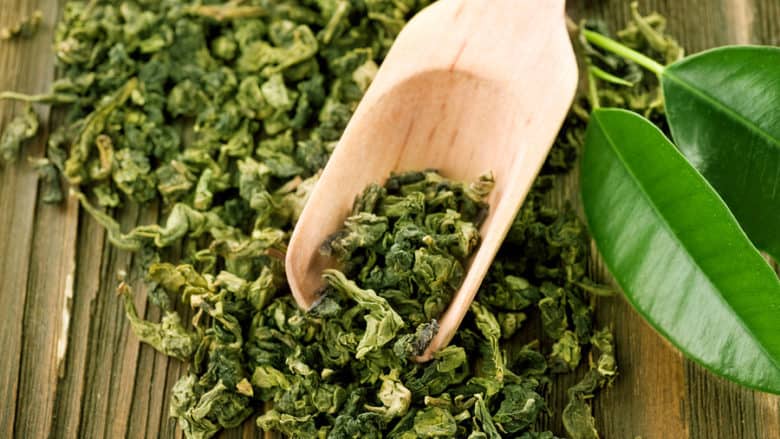
Green tea benefits go far beyond tea’s reputation as a meditative, yet refreshing drink.
Long used in Asia to promote health and longevity, western science now finds it may help prevent and treat some of our most vexing health problems.
Polyphenols, Catechins, Caffeine, Antioxidants
Key among teas’s more that 200 bioactive compounds that contribute to natural healing are polyphenols. Polyphenols are compounds made up of six different kinds of catechins.
Catechins are flavonoids, a group of compounds found in plant foods that have antioxidant and anti-inflammatory properties. The most abundant catechin, EGCG (epigallocatechin-3-gallate) is the most active and studied of all green tea ingredients and is used in green tea extracts.
Green tea, the unfermented leaf of the tea plant, Camellia sinensis, is richer in polyphenols than other types of tea. This is because it is produced by steaming fresh leaves instead of fermenting them as done with black and oolong teas.
Green tea also contains caffeine and antioxidants like vitamin C.
Caffeine improves thinking and alertness as it increases the release ofneurotransmitters. These brain chemicals stimulate the nervous system, heart, and muscles. It also acts as a diuretic, increasing urine output.
Antioxidants fight excess free radicals, a major contributor to accelerated aging and chronic disease.
What the Research Says
MedlinePlus reports on green tea benefit studies found in the Natural Medicines Comprehensive Database. They rate effectiveness for various conditions based on scientific evidence on a scale including Effective, Likely Effective, Possibly Effective, Possibly Ineffective, Likely Ineffective, Ineffective, and Insufficient Evidence to Rate.
Likely Effective:
- Genital warts. A specific green tea extract ointment (Veregen, Bradley Pharmaceuticals) is FDA-approved for treating genital warts.
- Increasing mental alertness (due to caffeine content).
Possibly Effective:
- Preventing cancers (bladder, esophageal, ovarian, and pancreatic). In one study, women who drank 2 or more cups of green tea each day had a 46% lower risk of getting ovarian cancer than women who didn’t drink green tea.
- Reducing the risk or delaying the onset of Parkinson’s disease. Drinking 1 to 4 cups of green tea daily seems to provide the most protection against developing Parkinson’s.
- Low blood pressure. Might help elderly people who have low blood pressure after eating.
- Decreasing high levels of fat like cholesterol and triglycerides in the blood.
- Reducing abnormal development and growth of cells of the cervix (cervical dysplasia) caused by human papilloma virus (HPV) infection.
- Preventing dizziness upon standing up in older people.
Possibly Ineffective:
- Preventing colon cancer.
Insufficient Evidence (More Research Needed):
- Cancer (Breast, Prostate, Lung, Cervical, Stomach, Gastric, Skin, Leukemia). In one study, Chinese men who drink more green tea seem to have a lower risk of developing prostate cancer. The more tea they drink, the more their risk drops.
- Dental cavities and gum disease (gingivitis). Chewing candy that contains green tea extract seems to control plaque build-up on the teeth and reduce gum swelling.
- Weight loss. A specific green tea extract (EGCG) seems to help moderately overweight people lose weight. But it doesn’t seem to help keep weight off.
- High blood pressure. Some research shows that drinking green tea regularly lowers the chance of getting high blood pressure. But not all research agrees.
- Stroke prevention. A large study done in Japan found drinking 3 cups of green tea per day seems to significantly lower the risk of having a stroke.
- Weak bones (osteoporosis). Drinking green tea for 10 years is associated with stronger bones.
- Type 2 diabetes. Research suggests that Japanese adults who drink 6 or more cups per day of green tea have a 33% lower risk of developing type 2 diabetes compared to those who drink one cup or less per day (specially true for women).
- Diarrhea.
- Chronic fatigue syndrome (CFS).
- Heart disease prevention.
- Kidney stones.
How to Get Green Tea Benefits
You can get green tea benefits in almost any form—brewed in a drink, healthy foods like energy bars, chewing gum, ointments and lotions for skin, and concentrated extracts.
Some apply green tea bags to their skin to soothe sunburn, decrease puffiness under the eyes, or to stop gums from bleeding. Others use it as a compress for tired eyes or headache, too.
The most common way to reap its benefits is to drink about 3 cups of green tea a day (provides 240-320 mg polyphenols). A cup is made with 1 teaspoon of tea leaves in 8 ounces boiling water. Add a little honey for a special treat.
Key Points
Green tea (like ginger, milk thistle, ginseng, garlic, and reishi mushroom) enjoys a growing body of evidence suggesting what has long been known in Asian countries—it promotes good health and a long life.
It may help prevent and treat a whole range of health concerns including cancer. Yet, because some green tea studies have conflicting findings more research is needed to show effectiveness for some concerns.
Click on this link for more on green tea side effects.
Please excuse me now, I’m going to have a cup of green tea benefits!
Sources and Resources
Duke, James A., The Green Pharmacy Guide to Healing Foods: Proven Natural Remedies to Treat and Prevent More Than 80 Common Health Concerns (Rodalestore.com: Rodale, 2008).
MedlinePlus, “Green Tea” at http://www.nlm.nih.gov/medlineplus/druginfo/natural/960.html.
Nagao, T. et. al, “Ingestion of a tea rich in catechins leads to a reduction in body fat and malondialdehyde-modified LDL in men,” American Journal of Clinical Nutrition 81, no. 1, January, 2005, 122-9.
NCCAM (National Center for Complementary and Alternative Medicine), “Herbs at a Glance: Green Tea” at http://nccam.nih.gov/health/greentea/index.htm.
Weil, Andrew, 8 Weeks to Optimal Health (New York: Ballantine Books, 2007).
